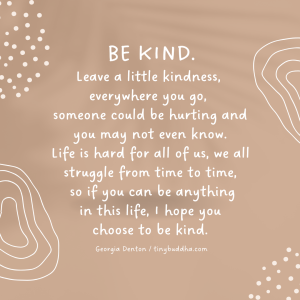
“When we judge or criticize another person, it says nothing about that person; it merely says something about our own need to be critical.” ~Unknown
We all have people in our lives who unintentionally hurt us. Their words may sound harsh. We may feel judged. And they may question our choices so much that we feel emotionally unsafe around them.
People can make comments about our career choice, living situation, life partner (or lack of), child-rearing decisions, and hobbies—and often when we didn’t ask for their opinion or advice.
Oftentimes, the healthiest choice is to stay away from these people. But sometimes we have to pay a hefty price for this choice, and it’s worth exploring other options.
For example, if some of these people happen to be relatives, or someone is your childhood best friend’s spouse or your daughter’s best friend’s mom, staying away may bring other challenges.
And even when we can avoid them completely, it can be valuable to have such people in our lives, as they empower us to learn and grow.
Note: I said we could invite them to be a part of our lives, not consume our lives! There is a big difference between the two.
A few years back, a friend’s words began to hurt me and brought tears to my eyes, lots of tears.
I knew her intentions were good, yet her comments on my choice of work, living situation, and vacations, and her constant unsolicited advice, left me feeling sad and angry.
I opened up my heart and ultimately felt judged and vulnerable.
I could have just let the friendship die, but that wasn’t an authentic manifestation of my values.
A part of me wanted to tell her exactly how I felt, but I didn’t have the courage to face the consequences if she didn’t understand where I was coming from, and that I really wanted to save the relationship.
I was sharing this with my mom, and in my pain I asked her why someone who cared about me would say the things my friend had said.
She said something that stuck. “What if you look at your relationship with her as an opportunity to grow? What if you focused on what you could do and change instead of complaining about her? What if she were a friend not to hold, nurture, and support you, but to help you get a tiny bit closer to your own truth along with some pain and discomfort?”
This was simple, yet deep and profound.
Over the last few years I have become a little more skilled and have more peace and joy around this relationship.
Here’s my list of the wonderful gems that have emerged, and my enhanced toolkit on dealing with difficult relationships.
1. Acknowledge the pain.
I have learned to acknowledge the discomfort with harsh words. This doesn’t mean wallowing in the pain or crying endlessly, but simply practicing awareness and noticing my own sensations and feelings as they arise, without getting overly attached to them or pushing them aside.
I have learned that resistance creates more suffering, and accepting our own discomfort is the first step to lasting peace.
2. Embrace your own fears and insecurities.
Difficult interactions give us an opportunity to embrace our own fears and insecurities. When we feel hurt about something, it’s often because it triggers some unresolved emotion within ourselves.
Recognizing this, we can practice compassionate self-inquiry, without anger or judgment toward ourselves.
I have noticed that comments around my choice of work are most difficult to hear, and as I have peeled the layers I have learned that is where my inner critic is the loudest.
What a lovely opportunity for me to come a tiny bit closer to my own truths, practice self- kindness, and work on myself instead of trying to change others.
3. Cultivate curiosity.
I have learned to have an open and curious mind toward critical behavior. I don’t need to judge or label, but I can still bring a deep sense of curiosity around why people may be behaving or saying such things.
With this sense of curiosity, we’re better able to practice compassion for other people’s pain and suffering.
Oftentimes when people say hurtful things, it’s because they are hurting and have unmet needs, and not because of who we are or what we have done.
4. Demonstrate vulnerability with intelligence.
I often felt upset because I opened my heart and revealed my imperfections and didn’t feel held or heard. I slowly learned that if someone might not accept my truth, it would be wise for me to exercise judgment around how much I share.
As Brené Brown says, “Our stories are not meant for everyone. Hearing them is a privilege, and we should always ask ourselves this before we share, ‘Who has earned the right to hear my story?’”
This didn’t mean that I was better or wiser than other people, but that at this point in our lives, my story doesn’t serve a purpose in our conversations.
5. Create boundaries.
Despite all the benefits that such interactions may bring, boundaries are essential.
A boundary meant saying no to that Saturday dinner invitation (with kindness and gratitude), or agreeing to meet for coffee on a weeknight instead of planning a long, leisurely Sunday brunch. It also meant exercising judgment around the topics that I’d discuss and the opinions that I’d offer.
If a relationship is causing you pain but you feel it’s worth keeping, ask yourself: What boundaries can I set to better take care of myself and my needs?
6. Refuel and recharge.
Practicing this piece can sometimes feel indulgent, or I can confuse this with “being weak,” but at its core, it is an act of strength.
I have learned to take time and create space (even if it’s just five minutes) to do something to recharge and refuel after such interactions—take a walk or practice meditation, for example—in order to ground myself and bring myself back to my sense of calm and worthiness.
—
When people are critical and judgmental, it’s often more about them than us. Still, this gives us an opportunity to learn about ourselves, take good care of ourselves, and practice responding wisely.
Which of these most resonated with you? What’s in your toolkit that could be added to this list?
Finger art of couple fighting image via Shutterstock
About Neha Mandhani
Neha is a leadership coach and career strategist for leaders who want to lead with their values and greater self-belief without burning themselves out. She believes that we can claim our own leadership power by connecting with our inner wisdom & find fulfillment through contribution & self-expression. She is the creator of “Inner Leader Coaching Circle” & “Bold Leadership for Brave Mothers” You can download the “Leadership Manifesto for Today’s Brave Woman” on her website.













 Though I run this site, it is not mine. It's ours. It's not about me. It's about us. Your stories and your wisdom are just as meaningful as mine.
Though I run this site, it is not mine. It's ours. It's not about me. It's about us. Your stories and your wisdom are just as meaningful as mine. 
very nice said. And everything resonated with me. Even i am surrounded by critical people and that has left a deep scar in me constantly trying to prove myself. I am , as you said, using this as an opportunity to practise calmness, be a better listener and most important, retain my sense of individuality and opinion if i really think i am right. Else, use it as a learning opportunity. Thanks
People who say hurtful things actually do NOT have good intentions. Believing they do is something we are taught by our culture, but it generally isn’t true. Their (or our, if we are doing the wounding) intentions have to do with defending their fears at any cost, feeding their envy, leaking their anger toward us, etc. Much of this behavior is unconsciously motivated, but that makes the intention no less harmful.
At the same time make sure that you are taking ownership of things that might be worthy of others giving you feedback -it is easy to live in denial and feel you are the victim when in fact they are trying to be a good friend by telling you what they see
#4 Demonstrate Vulnerability with Intelligence and Brene Brown’s quote that our stories are not meant for everyone, hit a home run. I have been practicing this more due to protecting myself from other’s judgments but her quote puts it so eloquently. Hearing my story is a privilege and one I no longer freely share. Thank you for writing this!
Great article and it beautifully reflect what I’ve been teaching my students, so I will definitely share it with them 🙂 thank you
Ummm if we can not share with this person, we set boundaries to not spend a lot of time with this person how then can a realtionship with the grow? Why would you even want to hang out in a toxic poison oak patch. all the good intentions, understanding self growth is not going to make you able to hang out in the poison without being affected. rubbish that tolerating toxic people is a chance to grow and look at yourself. I’ve sepnt my entire life trying to hang out with family members and look at myself…how i can change so that I won’t come away itching and in pain. The only answer I’ve finally come up with is that you just can not get close to them, you must wear a heavylayer of protection if you do get anywhere near.
I now prefer to spend my time and my love being around people who can relate in healthy ways.
Lovely article! I so appreciate your perspective here in light of some wonderful friendships that sometimes reflect a friend’s need to be heard and my need to learn more of myself. As a grandmother of two grandboys that have just finished college, I am still learning and growing. Thank you!
Thanks Preethi! Glad this resonated with you and nice to hear that you are leveraging these opportunities to connect with yourself and see how you can grow!
Diane – Thank you for sharing your perspective and I appreciate you adding in your voice. I agree that many a times people act unskillfully due to unconscious biases but I don’t know if they are always aware of the impact that this could have on the other person. Yes, there are times when people judge or say harsh things with an “intention” of putting you down but more often they are just saying things without even realizing what impact that can have – they may think they are helping you by giving some advice or sharing their perspective.
What do you think?
Hi Daniela – Wonderful reminder. Absolutely important to use this as an opportunity to reflect and see what we can learn and get better at. Often times, there can be nuggets of wisdom that can help us be a better version of ourselves! Well said:-)
If that critical someone is your wife it is difficult to move forward. I’ve lost all my power to boundaries when it comes to this and don’t know how to move forward. Creating them sometimes seem to make more problems. I have alot of work to do.
Critism and judgement do not provide an envoronment for growth. True feedback does.
I agree Dianne. Thank you for ypur perspective. It is wise y o know the difference betwee criticism and judgement which kills the spurit and true loving feedback which contributes to growth.
When you know deep down that what anybody says about you is totally irrelevant to who you are, you just hear them say things about you the same way you hear them say things about anything that you don’t take personally. It’s just information about them.
Yes, people do sometimes think they are helping, and often, this is just a case of emotional ignorance or being uncomfortable with the topic at hand. That’s why listening is so superior to talking!
Thanks Neha, Your post helped me step inside my wife’s shoes and understand how much critical I am being towards her, as a result how much discomfort I am experiencing. This post has added a new perspective on how I can stop forcing my expectations on her and set the healthy boundaries we require and still share the love we long for.
This is my first comment on tinybuddha, though this has been prime source of emotional support for years whenever I need some. Everytime I come back looking for support specific to my problem at that moment, I find it the first 3 posts. I feel as if posts have been put in order according to my problem. Many Thanks Lori.
Cheers, Veera
Couldn’t agree further Diane that listening is better than talking. I am working on getting better at listening more and talking less too:-)
True, but this is helpful when you can actually choose constructive feedback. There are times when we are faced with criticism and judgment and we need a toolkit to navigate that landscape as well:-) Would love to hear what works for you with those circumstances.
Thanks Anne for your feedback and I am glad this post spoke to you. Yes, Brene Brown is so skilled at articulating this point around using discretion with our vulnerability and stories. I so so love her work. Have you read her books and seen her TED talk? I am sure you will find a lot of value in case you haven’t…
Hi Bridget – Thanks for your feedback! I hope your students find it useful too:-)
Such a wonderful reminder John. It take a lot of wisdom, courage and strength to be able to look at other people’s words this way. Thank you for sharing your perspective.
Hi Sarah – Thank you for your perspective. I love your curiosity to learn and inspire your grandchildren. They sure are blessed to have such a wise grandmother:-)
Hi Bootsie – Thank you for sharing your perspective! I agree that in some circumstances it may be best to simply draw very strong boundaries and even move away from the relationship completely. However, I was referring to relationships where drawing such strong boundaries may be even counter productive and we could use these situations as a force for good.
I applaud you for the strength and wisdom to draw your lines and spend more time with healthy relationships.
Anthony – Thank you for your perspective and I wish you strength and wisdom as you navigate your relationship with your spouse.
Hi Veera – I am glad this post helped you practice more empathy toward your wife. I admire your self awareness to notice how your own words and your willingness to make changes. This is not easy and I applaud you for your kindness toward your self and your wife.
I am so glad to hear that Tiny Buddha has been a source of support for you and I too agree, much thanks to Lori for the wonderful work she is doing in the world.
Thank you. Lately I tend to react to these kinds of articles because I spent way too many years using them to keep looking at myself instead of facing the reality of the truly toxic and abusive people in my life. Too many inspirational truisms that kept me stuck. They may be true of basicallyhealthy people who are having a bad day but not those whose drive is to control others.
I have been employing these for quite sometime now. Unfortunately my main source of these feelings come from my mother.
I know why she behaves as she does, my response of sharing intelligently keeps her out everything, inciting more criticism. Same with retreating. I continually force boundaries and am met with even more ire.
It’s frustrating and heartbreaking because I can see and know how left out she feels. But every time I try to let her in, the results are disastrous. We both end up upset for days. Me, for her minimizing my feelings and her for not taking her advice.
Obviously, one cannot cut their mother or if their lives and no mother wants to feel sidelined.. But our difference in our lifestyles and personalities make this difficult the older I get (in my 30s).
Bootsie – I read this the same way. I have spent over 20 years trying to have a relationship with my toxic family. Doing all the managing my feelings and reactions so they do not negatively impact me but like you, I have finally reached the conclusion that at the end of the day you want to have loving, caring people in your life, not people that you have to build all sorts of protective boundaries to tolerate.
In my child life am cultivated bad attitude that deep rooted in my entire life,to ruin my life, how to over come this
bad things,am a student ,i always thinking bad and sex and visualisation of bad things
Thanks a lot of these meaningful words and this constructive article! Simple things are the most powerful and profound! I’ll try to apply them next time!
I understand that everyone isn’t perfect. We’re living in society where approval is needed. If someone were to make a mistake, they will be subject to criticism and judging. I feel that this behavior is unacceptable, and before someone starts pointing fingers at their own actions, they need to take a closer look at themselves, and back off.
My best friend was pregnant, which took me by surprise. She wasn’t getting enough support from her family, since her pregnancy was unplanned. I couldn’t be angry and judge mental towards her, because I didn’t have the right to be that way. All I could do was be supportive. She appreciated me standing by her. No matter what we’re going through in life, I know that we can always depend on each other.
Nobody has the right to judge anyone, due to their perfections. It’s impossible to express your vulnerability when you’re the subject of harsh criticisms. Try placing yourself in their shoes, and know what it feels like to be judged. I like to keep an open mind, and get to know that person for myself. For example, my friend has seven children. She tells me that she’s constantly getting judged. Although she’s taking care of all of them, people can keep their opinions to themselves.
Thank you, Neha, for sharing your story.
my perspective is people that say hurtful things is a coping mechanism. They have no other way of dealing with their anger. My wife did this and had such a profound effect on me and fed my shame and guilt and destroyed what little self worth I had.
Thank you so much for this insight. Years ago I worked with someone who I found to be critical and judgmental. We separated and recently I discovered after moving into a new neighborhood that she is my new neighbor. She stopped by to exchange phone numbers with me and made a comment, not aimed at me, but I still felt judged. I thought to myself later, should I ignore what she said or let her know I was offended by her comment. I realized that perhaps her comment was not meant as a judgement towards me, but because I remember her from 20 years ago as being judgmental that was the first thing popped into my head. I had to remind myself that who I was twenty years ago is definitely not who I am today and to meet her where she is now rather than how I remembered her.
I agree with you. I spent many years trying to get my mother-in-law to like me out of consideration, respect and love for my husband. However, after about seven years of getting nowhere I have completely cut her out of my life. It doesn’t mean that my husband or daughter doesn’t have a relationship, I don’t deal with her.
I’m not sure if I agree with you, Neha. I like your points that there is something to be said about a person who criticizes people and is judgmental. I agree that in one way, it is about them, but I also think that it is how they truly think of you. And you have to ask yourself that I suppose, whether or not you want to be associated with someone who has that thought of you. I think more often than not, we have to assume that they’re somehow just dealing with their own things, but the problem isn’t that, everyone has things they have to deal with. The problem is that the way they deal with their issues, is now turning into something damaging for you. I suppose if you’re consciously making the choice to stay in a relationship you’d rather not disturb, it may be bearable, but I think more often than not, it breaks your self esteem little by little- after all we’re also only human, and no matter how much we can rationalize that their words do not reflect us, we subtly think and begin to assume that they do. I’d say it would have to be a very very legitimate reason to do this to oneself. I probably would not do this for anyone else but my direct family and only after there’s been a real change.
I feel the same way…
It’s a little different if they have power to make hell for you, ie, they offer criticism which is a thinly veiled threat to conform to their wishes or else. You can’t just ignore it and not take it personally. It’s not irrelevant if it can have dire consequences on your whole life.
7 call people out on their bad behavior and let people know in no uncertain terms you will not allow people to treat you like crap! talk things out before hurt feelings build up and fester!
I have very opinionated, judgemental in laws. They are all very critical in general. Some of them are nice and in the intention behind their “suggestions” they think they are being helpful. The other half just try and suss out my weak points to insult me. In general it is hard to be around them and we don’t see them all that much. They subscribe to the shrine of status and money. Nothing is ever good enough. It was must have been hell for my husband growing up with that. He himself is a picture of attractive and successful, yet I can tell they are always sizing him up. They all have money and are thin, etc. yet very unhappy.
My husband judges every single person that crosses his path. And if i talk to someone he doesn’t sees fit he expects me to judge aswell. I am more of a if the person is nice to me that is good enough to talk to them, i tend not to judge anybodies life because i don’t see myself as better than anyone. But when he does start talking it annoys me and it makes me angry of all his negativity. His negativity is contagious i try to be positive but still it can be depressing. How can i keep from his negativity from affecting me emotionally?
Note: I am not a therapist but this is actually very common. Please seek help immediately, there are avenues for you to heal yourself before you put the same pain onto someone else! You are not too broken, you can come back from this!